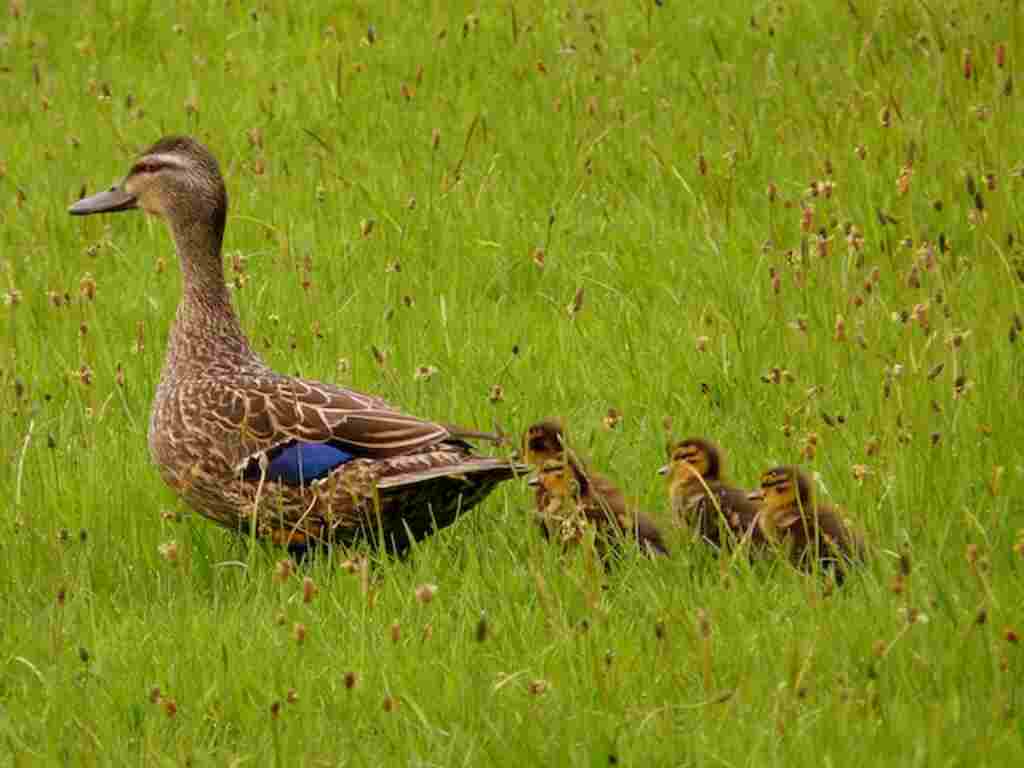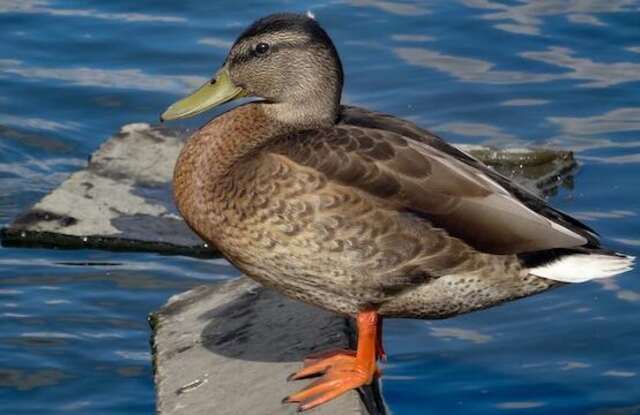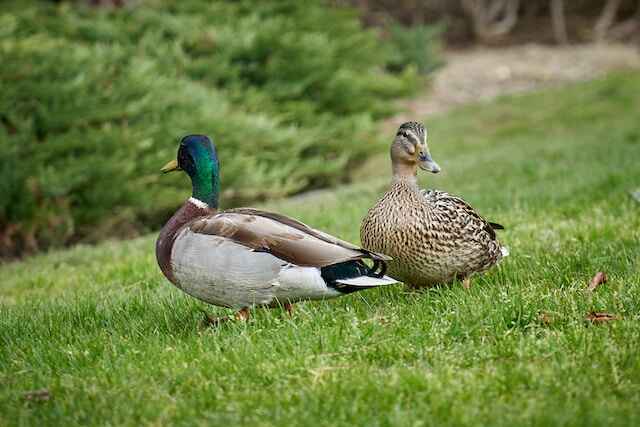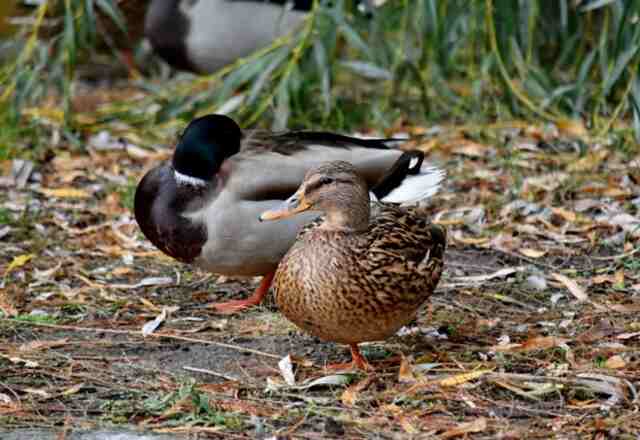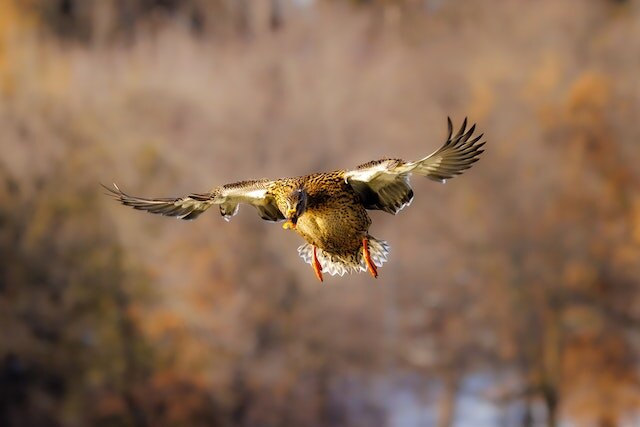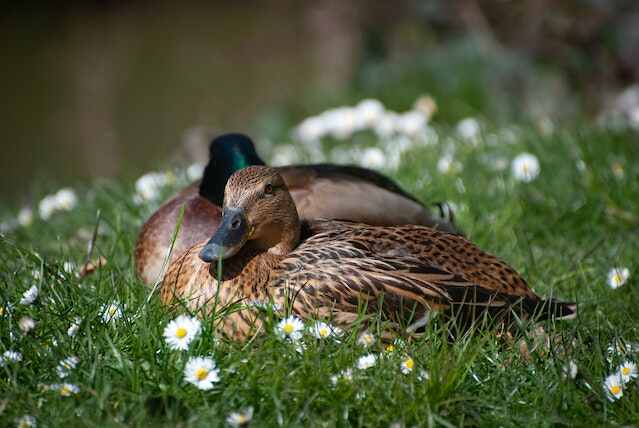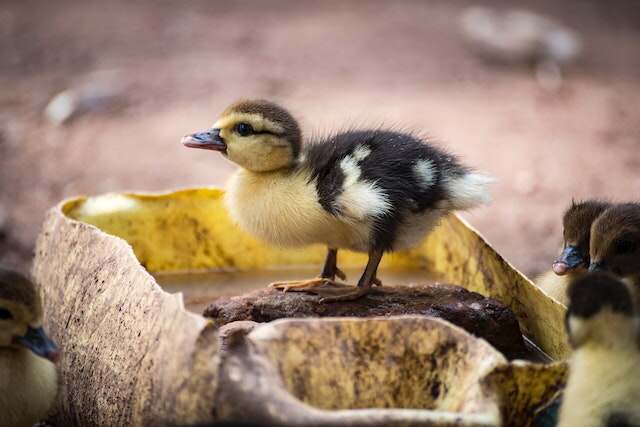“Do Ducks Eat Grass?” Yes, they do! But, is it their favorite food? Are there any risks involved? Can they eat it all day, every day? Don’t worry, we’ve got you covered.
In this article, we’ll answer all your burning questions about ducks and their grassy diet. Keep reading to discover the truth about what ducks eat, and why it’s essential for their health and well-being.
Table of Contents
- 1 Overview
- 2 Nutritional Value of Grass
- 3 Benefits of Grass for Ducks
- 4 Types of Grass Safe for Ducks
- 5 Other Plants Ducks Can Eat
- 6 Importance of a Balanced Diet
- 7 Potential Risks and Precautions
- 8 Feeding Guidelines for Grass
- 9 Other Foods Ducks Should Eat
- 10 Dietary Needs for Ducklings
- 11 Variations in Duck Breeds’ Diets
- 12 Feeding Habits of Ducks
- 13 FAQs: Do Ducks Eat Grass?
- 14 Conclusion
- 15 Author
Overview
Discover the surprising benefits of incorporating fresh, chemical-free greens into your feathered friends’ diets in order to keep them healthy and happy.
Ducks are omnivorous birds, and their feeding habits include eating a variety of plant-based foods, such as grass. But can ducks eat grass? Yes, they can! In fact, grass is a major part of a duck’s diet in the wild.
Adding grass to your ducks’ diet is a great way to provide essential nutrients and minerals. Grass contains fiber, protein, vitamins, and minerals that are vital for a duck’s health.
The caeca in ducks help them digest fibers and cellulose in grass, and the protein content ranges from 16 to 18%.
Fresh grass tips and shoots are more nutritious, and ducks can eat any type of grass as long as it is delicate enough for their beaks to break into.
However, dry stalks and grass should be avoided, as they can cause choking. Incorporating grass into your duck’s diet is a great way to supplement their diet, but it should not be their only food source.
A poor diet can lead to health issues for ducks, such as Crop Impaction or Sour Crop.
Ensure that you provide your ducks with a balanced diet that includes commercial duck food, a good quality vitamin supplement, fresh vegetables, and protein sources.
By providing your ducks with a varied diet, you can ensure that they have all the nutrients they need for optimum health and wellbeing.
Nutritional Value of Grass
Who knew that the humble grass could be a nutrient-rich superfood for our feathered friends? When it comes to ducks feeding habits, grass is a major part of their diet in the wild.
Grass contains important nutrients such as fiber, protein, vitamins, and minerals that are essential for a well-balanced diet.
To understand the nutritional value of grass for ducks, let’s take a look at the following table:
| Nutrient | Amount per 100g of Grass |
|---|---|
| Fiber | 35% – 50% |
| Protein | 16% – 18% |
| Calcium | 0.3% – 0.5% |
| Magnesium | 0.2% – 0.3% |
As we can see, grass contains a high amount of fiber and protein, which is essential for the duck’s digestive system.
Additionally, grass also contains calcium and magnesium, which are necessary for the growth and development of healthy bones and muscles.
While not all grasses are created equal, some nutritious grasses that ducks can eat include rye and wheatgrass.
However, it’s important to note that grass alone does not contain enough nutrients and minerals to constitute a balanced diet.
A mixture of other food such as leafy greens and animal protein should be given to ducks for a well-rounded diet.
As we explore the benefits of grass for ducks, it’s important to remember that while grass is a safe and nutritious food source, it should be given in moderation to prevent crop impaction or sour crop.
Benefits of Grass for Ducks
You’ll be surprised to learn how beneficial grass can be for your feathered friends, providing essential nutrients and minerals for their health and well-being.
Grass is a nutritious food for ducks, and it is a major part of their diet in the wild. Ducks are omnivores and can safely consume almost all plant-based foods, including grass.
Grass contains important nutrients for ducks such as fiber, protein, vitamins, and minerals. The caeca in ducks help them digest fibers and cellulose in grass.
Grass fiber concentration ranges from 35% to 50%, and protein content in grass varies from 16 to 18%.
Grass also contains important minerals such as calcium, phosphorus, magnesium, sodium, and zinc. Vitamin C is also present in grass and is essential for laying ducks to prevent slender or shell-less eggs.
Feeding grass to ducks in moderation is important to prevent crop impaction. Dry stalks and grass should be avoided as they can cause choking.
However, ducks can eat any type of grass as long as it is delicate enough for their beaks to break into. Rye and wheatgrass are safe to feed to ducks.
Domestic ducks can eat grass as long as it is fresh and chemical-free. Mowed grass can also be fed to ducks as long as it is fresh and wholesome.
Types of Grass Safe for Ducks
If you’re curious about which types of grass your feathered friends can safely consume, there are some options such as rye and wheat grass that are suitable for domestic ducks.
Ducks feeding habits include vegetation consumption, and grass is a significant part of their diet. However, not all types of grass are safe for ducks to eat, so it’s important to know which ones are suitable.
Rye and wheat grass are safe to feed to ducks as they are delicate enough for their beaks to break into. Moreover, they contain essential nutrients such as fiber, protein, vitamins, and minerals that are important for duck’s health.
Fresh, young grass tips and shoots are more nutritious for ducks, and they should be fed in moderation to prevent crop impaction.
It’s essential to note that feeding ducks solely on grass is not recommended as it can be challenging for their crop health and lead to health issues such as Crop Impaction or Sour Crop.
For a balanced diet, ducks should be supplemented with other foods and nutrients.
In the next section, we will discuss other plants that ducks can eat to ensure they have a well-rounded diet.
Other Plants Ducks Can Eat
Looking for more options to add to your duck’s diet? While grass is safe and nutritious for ducks to consume, there are other plants that can be added to their feeding habits.
Lettuce is a great choice for ducks as it contains vitamins A, B, and C, as well as calcium and iron. Dandelion greens are another option, and they’re high in iron, calcium, and vitamins A and C.
Vegetables are also a great addition to a duck’s diet. Lettuce, kale, and carrots are all excellent choices for vegetables for ducks. However, it’s important to make sure that any vegetables given to ducks are free of harmful chemicals and pesticides.
Ducks need fresh and chemical-free vegetation in their diet to aid in proper digestion. While grass is a staple in a duck’s diet, it’s important to supplement their diet with other plants and nutrients.
A balanced diet is essential for ducks to maintain good health. In the next section, we’ll discuss the importance of providing ducks with a variety of foods to ensure that they receive all the necessary nutrients for proper growth and development.
Importance of a Balanced Diet
To keep your feathered friends healthy and happy, it’s crucial to provide them with a diverse range of foods that will help them spread their wings and reach their full potential.
While grass can be a nutritious and healthy addition to their diet, it shouldn’t be the only thing they eat. Ducks feeding habits are varied, and they require a balanced diet to thrive.
While the natural diet of ducks in the wild consists of a range of foods such as aquatic plants, small fish, and crustaceans, domestic ducks need a more balanced diet.
While they can eat grass, it’s essential to supplement their diet with other foods. A balanced diet for ducks should include commercial duck food, vegetables such as lettuce, kale, and carrots, and protein sources like worms, bugs, and small fish.
In addition to providing a balanced diet, it’s crucial to monitor the amount of grass ducks eat.
While it can be a nutritious part of their diet, too much grass can lead to health problems such as crop impaction and sour crop.
To keep your ducks healthy and happy, make sure to provide them with a varied diet and monitor their grass consumption.
Potential Risks and Precautions
Feeding your feathered friend’s grass may seem like a great idea, but there are some risks and precautions you need to be aware of.
While ducks can eat grass, and it’s a natural part of their feeding habits, it’s important to monitor their intake and ensure that the grass is free of harmful chemicals.
Domestic duck diets should also be balanced with other foods and nutrients to prevent any health issues. One risk of feeding ducks grass is the potential exposure to pesticides, herbicides, and fertilizer.
If you plan on feeding your ducks grass, make sure the lawn is mowed at a higher setting and cut the grass into small pieces.
Avoid feeding treated grass, moldy or fungus-infected grass, and grass clippings, as they can make ducks sick.
Lawn fertilizers contain high levels of nitrogen, which can also be harmful if ingested in large quantities. Despite the risks, feeding ducks grass can be safe and nutritious when done in moderation.
Grass contains important nutrients and minerals that a duck needs in its diet. However, it shouldn’t be the sole component of their diet.
A balanced diet should include a mixture of other food sources, such as leafy greens, vegetables, and protein.
By following these precautions and feeding guidelines for grass, you can offer your ducks a healthy and well-rounded diet.
Feeding Guidelines for Grass
You can ensure that your feathered friends are getting a healthy and well-rounded diet by following these simple feeding guidelines for grass.
This will provide them with all the essential nutrients and minerals they need to stay healthy and strong. However, grass alone does not contain enough nutrients and minerals to constitute a balanced diet.
To prepare grass for feeding to ducks, mow the lawn at a higher setting, cut the grass into small pieces, and offer it fresh.
Grass clipping should be avoided as they quickly lose nutrients. Grass should be chemical-free and not treated with pesticides or herbicides.
Feeding patterns of ducks should be monitored, and grass should be fed in moderation to prevent crop impaction.
A mixture of other food should be given to ducks for a well-rounded diet. Leafy greens, vegetables, fruits, grains, and protein sources such as worms, bugs, and small fish should be included in their diet.
Providing your ducks with fresh, clean water for hydration and digestion is also essential.
Other Foods Ducks Should Eat
If you want to keep your feathered friends healthy and happy, it’s important to offer them a variety of foods in addition to grass.
While grass is a great source of nutrients, ducks feeding habits go beyond just foliage consumption. A balanced diet for ducks should include various leafy greens, vegetables, and even insects.
To help you plan out your duck’s diet, here’s a table of some of the best foods you can offer them:
| Food | Benefits | Precautions |
|---|---|---|
| Leafy greens (lettuce, kale, spinach) | Good source of vitamins and minerals | Avoid wilted or moldy leaves |
| Vegetables (carrots, peas, corn) | Provides needed nutrients | Avoid feeding canned or salted veggies |
| Insects (worms, mealworms, crickets) | Great source of protein | Only offer as treats in moderation |
| Weeds (dandelion greens, clover) | Full of nutrients and minerals | Make sure weeds are free of pesticides or chemicals |
Can ducks eat weeds? Yes, weeds like dandelion greens and clover are excellent options for duck food. In fact, many ducks enjoy eating weeds as a refreshing and nutritious snack. These plants are full of nutrients and minerals that can help keep ducks healthy and strong.
Feeding your ducks a variety of foods will ensure that they are getting all of the necessary nutrients for optimal health.
While grass is a good source of fiber, it cannot provide all of the necessary vitamins and minerals that a balanced diet requires.
In the next section, we will discuss the dietary needs of ducklings and how to ensure they are getting the nutrients they need for proper growth and development.
Dietary Needs for Ducklings
To ensure that your ducklings grow up healthy and strong, meeting their dietary needs is as essential as a duck taking to water.
As omnivores, ducklings require a balanced diet consisting of both plant and animal-based foods. While grass can be a part of their diet, it is not enough to meet all their nutritional requirements.
You should supplement their diet with starter or grower feed that is specially formulated for waterfowl nutrition.
When it comes to the ducks feeding habits, it is important to note that ducklings need about 80% constructed starter/grower feed in their diet.
This feed is formulated specifically for their nutritional needs and contains a balance of protein, vitamins, and minerals.
Inadequate nutrients can cause physical problems that are difficult to correct in adult ducks. Therefore, it is crucial to provide a well-balanced diet to ensure proper growth and development.
While the dietary needs of ducklings are similar across breeds, different breeds have different diets. For example, some breeds primarily eat aquatic plants like duckweed and water lilies, while others eat a wider range of foods.
It is important to research the dietary needs of your specific breed and provide them with a balanced diet that meets their nutritional requirements.
In the next section, we’ll explore variations in duck breeds’ diets and how to create a well-balanced diet for your feathered friends.
Variations in Duck Breeds’ Diets
Exploring the variations in diets across different breeds of ducks can help ensure that they receive a well-balanced diet that meets their unique nutritional requirements.
While all ducks are omnivores, different types of ducks have different dietary requirements for grass.
For instance, diving ducks, such as the Canvasback, Redhead, and Ring-necked Duck, rely more on animal protein for their diet, while dabbling ducks, such as the Mallard and American Black Duck, feed more on vegetation.
To give you an idea of the differences in diets across various breeds of ducks, here is a simple table:
| Duck Breed | Primary Diet | Secondary Diet |
|---|---|---|
| Mallard | Vegetation | Insects |
| Pekin | Commercial Feed | Vegetation |
| Muscovy | Insects | Vegetation |
| Buff | Commercial Feed | Vegetation |
| Indian Runner | Insects | Vegetation |
As you can see, while some breeds rely heavily on commercial feed, others prefer a more natural diet. It is essential to understand your duck’s feeding habits and dietary requirements to ensure they receive a well-balanced diet that meets their nutritional needs.
Knowing what to feed your ducks is crucial to their health and well-being. In the next section, we will address some frequently asked questions about feeding ducks, including what foods to avoid and how much to feed them.
Feeding Habits of Ducks
Let’s answer some frequently asked questions about ducks’ feeding habits. You might be wondering, can ducks eat grass as their primary food source?
While grass is a nutritious part of a duck’s diet, it should not be their sole source of food. Ducks are omnivores and need a well-balanced diet that includes a variety of foods, including protein and leafy greens.
So, what do ducks eat besides bread? Ducks can eat a wide variety of foods, including vegetables like lettuce, kale, and carrots, as well as animal protein sources such as worms, bugs, and small fish.
Ducklings should have about 80% of constructed starter/grower feed in their diet to ensure they receive all the necessary nutrients for proper growth and development. It’s also essential to ensure the food is free of pesticides and harmful chemicals.
Feeding ducks can be a fun activity, but it’s important to do it safely. Treated grass, moldy or fungus-infected grass, and lawn fertilizer can be harmful to ducks and should be avoided.
Remember to provide clean water for hydration and digestion, and be mindful of the amount of food you offer. While ducks can eat grass, it should be offered in moderation to prevent crop impaction and ensure they receive a well-balanced diet.
FAQs: Do Ducks Eat Grass?
Can ducks eat grass clippings?
Yes, ducks can eat grass, but it’s important to avoid feeding them grass clippings. Grass clippings quickly lose their nutrients and can cause digestive problems for ducks.
Instead, provide fresh, young grass tips and shoots as they are more nutritious for ducks. It’s also crucial to avoid grass sprayed with herbicides or pesticides, as these can be harmful to ducks.
While grass is a good source of nutrients, a well-balanced diet for ducks should include a variety of foods, including commercially prepared duck food and a good quality vitamin supplement.
How much grass should be fed to ducks in a day?
To ensure a well-balanced diet for your ducks, it’s important to supplement their food with a variety of nutrients and minerals. While grass can be a nutritious addition to their diet, it shouldn’t be their sole source of food.
In terms of how much grass to feed them, it depends on the environment and availability. It’s recommended to offer grass in moderation and to always monitor their intake to prevent crop impaction.
Remember to avoid feeding them grass that has been treated with pesticides or herbicides, and to cut it into small pieces to prevent choking.
Offering a mixture of other foods, such as leafy greens, vegetables, and protein sources, is crucial for the health and wellbeing of your ducks.
Do all breeds of ducks primarily eat aquatic plants?
Not all breeds of ducks primarily eat aquatic plants. While some breeds do rely heavily on eating plants found in the water, others have a more varied diet and can consume almost anything, including grass.
It’s important to note that while grass is safe for ducks to eat, it shouldn’t be the sole source of their nutrition. Ducks need a well-balanced diet that includes a variety of foods, including leafy greens, vegetables, and protein sources like bugs or small fish.
It’s also crucial to be mindful of any potential risks or precautions when feeding ducks, such as avoiding treated grass or moldy grass that could make them sick.
What are some common signs of crop impaction or sour crop in ducks?
If your duck is experiencing crop impaction or sour crop, there are a few common signs to look out for. These can include a distended crop, vomiting, decreased appetite, lethargy, and a foul odor coming from the crop area.
If you notice any of these symptoms, it’s important to take action quickly to prevent further health complications.
This may involve providing your duck with smaller and more frequent meals, removing any impacted material from the crop, and ensuring that your duck has access to clean and fresh water at all times.
Additionally, it’s crucial to provide your duck with a balanced diet that includes a variety of foods and nutrients, and to monitor their grass consumption to prevent crop impaction.
Can ducks survive on a diet of only grass?
Did you know that grass is a major part of a duck’s diet in the wild?
However, while ducks can safely consume almost all plant-based foods, feeding them grass alone is not recommended.
Grass contains important nutrients for ducks such as fiber, protein, vitamins, and minerals, but a mixture of other foods should be given for a balanced diet.
Eating too much grass can also be bad for ducks and cause crop impaction or sour crop.
It’s important to supplement their diet with commercially prepared duck food and a good quality vitamin supplement to ensure their health and proper development.
So, while ducks can survive on a diet of grass, it’s not recommended for their well-being.
Conclusion
So, do ducks eat grass? Yes, they do!
Grass can be a great addition to a duck’s diet as it provides essential vitamins and minerals. However, it is important to make sure the grass is fresh and chemical-free.
While there are benefits to feeding ducks grass, it is important to remember that it should not be the only source of food for them.
In conclusion, think of ducks grazing on green grass as a symbol of their natural habitat and freedom. Just like how grass is a vital part of their environment, it is important for us to ensure that they have access to safe and nutritious food.
By taking care of the food we give them, we can help ducks thrive and continue to be a symbol of nature’s beauty and resilience.

